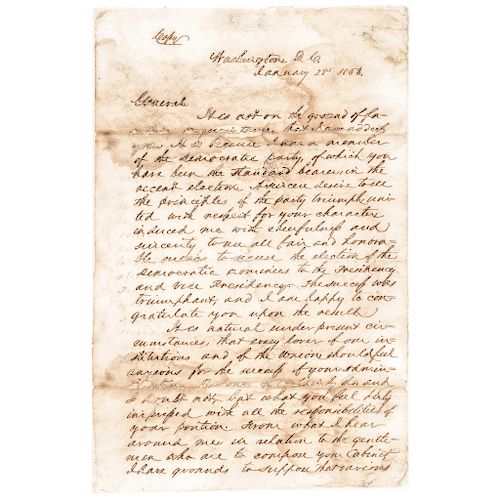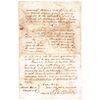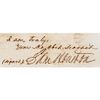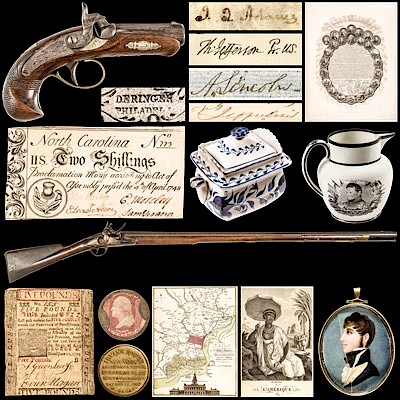1853 SAMUEL - SAM HOUSTON Retained Copy Autograph Letter Signed of Seven Pages
Lot 49
Categories
Estimate:
$1,800 - $2,400
Absentee vs Live bid
Two ways to bid:
- Leave a max absentee bid and the platform will bid on your behalf up to your maximum bid during the live auction.
- Bid live during the auction and your bids will be submitted real-time to the auctioneer.
Bid Increments
| Price | Bid Increment |
|---|---|
| $0 | $10 |
| $200 | $20 |
| $300 | $25 |
| $500 | $50 |
| $1,000 | $100 |
| $2,000 | $200 |
| $3,000 | $250 |
| $5,000 | $500 |
| $10,000 | $1,000 |
| $20,000 | $2,000 |
| $30,000 | $2,500 |
| $50,000 | $5,000 |
| $100,000 | $10,000 |
| $200,000 | $20,000 |
| $300,000 | $25,000 |
| $500,000 | $50,000 |
About Auction
By Early American History Auctions
Oct 19, 2019
Set Reminder
2019-10-19 12:00:00
2019-10-19 12:00:00
America/New_York
Bidsquare
Bidsquare : Historic Autographs-Currency-Political-Americana-Militaria-Guns
https://www.bidsquare.com/auctions/early-american-history-auctions/historic-autographs-currency-political-americana-militaria-guns-4513
326 Lots of Rare, Historic Autographs, Americana, Civil War Era, George Washington, Abraham Lincoln, Black History, Revolutionary War Era, Colonial America, Federal Period, War of 1812, Colonial Currency, Indian Peace Medals & more... Early American History Auctions auctions@earlyamerican.com
326 Lots of Rare, Historic Autographs, Americana, Civil War Era, George Washington, Abraham Lincoln, Black History, Revolutionary War Era, Colonial America, Federal Period, War of 1812, Colonial Currency, Indian Peace Medals & more... Early American History Auctions auctions@earlyamerican.com
- Lot Description
Autographs
"Sam Houston" Signed Seven Page Autographed Letter
SAMUEL "SAM" HOUSTON (1793-1863). American Statesman, Politician, and Soldier, best known for his leading role in bringing Texas into the United States, 7th Governor of Texas and the Only Person in U.S. history to have been the Governor of Two Different States.
January 28, 1853-Dated, Great Content Autograph Letter Signed, "Sam Houston" as Texas Senator, 7 pages, measures 8.25" x 12.75", Washington, D.C., Fine. His own retained "Copy" for his personal archive, likely a Letterpress Copy made by Houston himself by Pressing a Wet Ink Letter Onto Tissue Paper, a process originated by James Watt circa 1780. As such, there is some missing and/or partly illegible areas of text caused by the delicacy of the special very thin tissue paper used for the transfer process of the ink. Each leaf is archivally sealed in an acid free plastic for protection and display and sold "as is" as such. Addressed to "Gen. Frank Pierce" at lower left of last page.
In this Letter, then Texas Senator Sam Houston writes this missive to fellow Democrat and President-Elect Franklin Pierce (1804-1869) in the Winter of 1853. Sam Houston first congratulated Pierce on his political victory. Second, he urged the future 14th U.S. President to choose carefully his Cabinet members. In this way, Cabinet members would not feel obligated to anyone except the President, who had granted them their prestigious posts.
Sam Houston offers a damning critique commentary of the current political system as he saw it. Ever since the 7th U.S. Presidency of Andrew Jackson (1767-1845), who had unfortunately surrendered to outside pressures in selecting his Cabinet members, the last six Presidential administrations had been rife with corruption, according to Houston. The self-reliant Texas Senator urged President-Elect Pierce to reverse the last sixteen years of nepotism and cronyism by setting a new example. At its conclusion, this Letter bears a massive wet transfer process signature, (signed) "Sam Houston" measuring 3.5" long. Please take a few more moments to read the entire complete text of this amazing Sam Houston Letter on our website at: www.EarlyAmerican.com
This 7 page Sam Houston Autographed "Copy" Letter is made of a copy process invented by James Watt circa 1780. As the steel pen gradually replaced the quill pen from the 1820s, copy ink was also modified by the adding sugar or glycerine in order to slow down its drying. This method of copying alleviated the urgency of making a copy while the ink was still wet and enabled more than one copy to be made. Inks other than iron gall-inks were used but the principle remained the same. For example, logwood dye and some of the early (post-1860)
synthetic dyestuffs were all tried in copying inks. But the greatest modification was
the transition from making copies on single sheets of paper to making copies in a
copy book or wet letter book.
This historic content Sam Houston Letter reads, in full:
"General --
It's not on the ground of familiar -- that I am addressing you It is because I am a member of the Democratic party, of which you have been the standard bearer in the recent election. A sincere desire to see the principles of the party triumph united with respect for your character induced me with cheerfulness and sincerity to use all fair and honorable success to secure the election of the Democratic nominees to the Presidency and vice Presidency.
The success was triumphant, and I am happy to congratulate you upon the result.
It's natural under present circumstances, that every lover of our institutions and of the Union should feel anxious for the success of your administration is one I certainly do, and I doubt not, but what you feel duly impressed with all the responsibilities of your position. From what I hear around me in relation to the gentlemen who are to compose your Cabinet I have ground to suppose that various Individuals are pressed upon your notice by numerous gentlemen each clamering for their respective favorites, places in your cabinet these circumstances, will most reasonably suggest reflections, as to what might be the proper course for a President to pursue in the formation of his cabinet.
No one, I presume, will deny a proposition so self evident, as that the President, is to be responsible to the American people for the character and acts of the gentlemen who com=pose his Cabinet. From my observation in life I have come to the conclusion that as the President is responsible for the actions of his cabinet, the right to select its members, independent of all extraneous influences is a conceded point.
Perhaps one of the most unfortunate political events in General Jackson's life may be traced to the contrary principles he permitted individuals to be urged upon him by most respectable influences, and yielding to that pressure placed persons in his cabinet who would not have been selected by his uninfluenced choice. Hence it was composed of discordant materials, and the consequences was the removal of the members who formed the original Cabinet, and the formation of one entirely new composed of gentlemen of his own selection.
In my opinion it is not a reason sufficient to urge the pretensions of gentlemen because they possess marked ability, or that they have powerful and influential friends, or that those friends may desire to obtain for them a commanding position that they may enjoy a large share of political influence to induce the Executive to waive his own preference and defer to the wishes of others.
The relations between the Executive and his Cabinet are of a delicate confidential character. He desires for his confidential advisers, those on whom he has unbounded reliance. They ought not only to harmonize touching political subjects, but a personal intimacy and respect should exist between all the members. So one can as properly judge of the important and delicate relations as the Executive himself. If he has not full confidence in the members of his Cabinet, harmony cannot exist, and suspicions once entertained would embarrass.
Not only the Executive but clog the measures which he might think most important to the country's prosperity. If he selects gentlemen whose personal and political relations he approves, the consequence will be that they will feel that they owe their selection to him, and their allegiance will be necessarily given to him alone and not to others. Their feelings of esteem and gratitude toward him will be a guaranty of their fidelity and their efforts will be united in maintenance of the principles which he represents, and the success of his measures.
If he were to select his cabinet upon the recommendation of others, those who are selected would be aware of the influence which had been exercised in their behalf with the Executive and instead of feelings under obligations to him they would naturally advert to the circumstances which caused him to make the selection and instead of feeling their dependence upon him and an interest in the success of his Administration they might imagine that uninfluenced he would not have selected them. Hence their sense of obligation to him would be lessened by the reflection that the influence which brought them into the cabinet, was irresistible and therefore the President not independent of them.
So far as I hear suggestions I conclude that the Nation expects an able and faithful administration of=the affairs of government by you. And that a strict adherence to the principles laid down by Gen. Jackson will be the land marks of which the policy of the Nation will be managed by your recommendation And under your guidance. So far as any individual opinions and feelings are concerned, I can desire nothing more and hope for nothing less. I will rejoice to resist, so far as my situation in the Senate will enable me an honest patriotic President in quelling the rank abuses which have grown up since General Jackson left office. It will prove an Herculean task.
Corruption infects the very atmosphere of the Government but few places are now sought by the tribes who hunt the spoils of offices without a -- to some speculations or illicit gains - scarcely a contract is made with public functionaries without covering some fraud and enormous claims are and carried against the Government by infamous agencies, employing fraud and bribery as the means. I declare to you Sir that I have found from some examinations I have been called upon to make a d-- as the heart of the Government which unless arrested, must eventually undermine -- to speculations.
In Gen. Jacksons time, the contest grew out of the attempt of the rank of the United States to engraft a corrupt monied influence on the government to gain a partial control over its finances; now the Government in all its branches is more corrupt than the Bank ever was verging to that jobbing system which makes the English Government a cure to the unhappy millions that live under it.
The Commanding role which brought you to the Presidency in such times, marks the confidence of your country secure in the ability and fearless probity in which they rely for the reversal of this downward tendency. A cabinet of irreproachable and unapproachable integrity, if intelligent and industrious, is all you want in such a work the rest depends on Yourself. Relying with full faith on an honest course you may boldly press on to the extirpation of abuses, and set at defiance dictating leaders of factions or sections the people will -- General I have submitted these as some of my reflections, in all frankness and good wishes for you personally and politically. I have done so with more freedom because no consideration would induce me to remain in Official position if approached in Washington. -- ... (Signed) Sam Houston"
- Shipping Info
-
Early American provides in-house worldwide shipping. Please contact us directly if you have questions about your specific shipping requirements.
-
- Buyer's Premium



 EUR
EUR CAD
CAD AUD
AUD GBP
GBP MXN
MXN HKD
HKD CNY
CNY MYR
MYR SEK
SEK SGD
SGD CHF
CHF THB
THB













